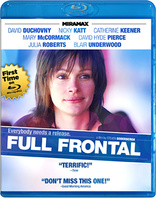Full Frontal Blu-ray Movie
HomeFull Frontal Blu-ray Movie 
Echo Bridge Entertainment | 2002 | 112 min | Rated R | Mar 10, 2013Movie rating
5.3 | / 10 |
Blu-ray rating
| Users | 0.0 | |
| Reviewer | 3.0 | |
| Overall | 3.0 |
Overview
Full Frontal (2002)
A day in the life of a group of men and women in Hollywood, in the hours leading up to a friend's birthday party.
Starring: Julia Roberts, David Hyde Pierce, David Duchovny, Nicky Katt, Catherine KeenerDirector: Steven Soderbergh
| Romance | Uncertain |
| Comedy | Uncertain |
Specifications
Video
Video codec: MPEG-4 AVC
Video resolution: 1080p
Aspect ratio: 1.78:1
Original aspect ratio: 1.85:1
Audio
English: DTS-HD Master Audio 2.0 (48kHz, 24-bit)
Subtitles
None
Discs
50GB Blu-ray Disc
Single disc (1 BD)
Playback
Region free
Review
Rating summary
| Movie | 3.0 | |
| Video | 3.0 | |
| Audio | 2.5 | |
| Extras | 3.0 | |
| Overall | 3.0 |
Full Frontal Blu-ray Movie Review
No Fig Leaf
Reviewed by Michael Reuben April 28, 2013Note: Despite the labeling, the version of Full Frontal presented on this Echo Bridge Blu-ray is not the 101-minute version originally released to theaters and on DVD. This is an undocumented "extended" version that runs 112 minutes. The theatrical version can be viewed, but not heard, in standard definition as an "Alternate Edit" with commentary as an extra under special features. Director Steven Soderbergh first gained attention in 1989 with the independent film sex, lies, and videotape, but by 2002 he'd become a mainstream filmmaker with a best director Oscar and a trifecta of successful mainstream films in Erin Brockovich (2000), Traffic (2000) and Ocean's Eleven (2001). Restless to return to his experimental roots, Soderbergh plunged into the project that became Full Frontal, which he called a "karmic sequel" to sex, lies and was made on a budget of $2 million dollars. Although Soderbergh's reputation and network of connections allowed him to cast the project with an Altmanesque collection of recognizable faces, the shooting conditions were barebones. In a set of "rules" attached to each actor's copy of the script, Soderbergh specified that they would wear their own clothes, do their own hair and makeup and drive themselves to the set. There would also be no craft service. Nevertheless, everyone was commanded to have "fun". Shot primarily on consumer grade digital video, Full Frontal was released in August 2002 to a collective, "Huh?" The late Roger Ebert pronounced it "amateurish". Even Soderbergh's fans were disappointed. Was this what Hollywood had done to him? Full Frontal isn't a very good film, but it's an intriguing experiment, and its interest has increased with the passage of time. Soderbergh was a fan of Fox TV's long-running show COPS, which ranks as one of the first reality shows, and he consciously adopted its style for much of Full Frontal. The film's movie-within-a-movie (within a third movie) plot is prescient in its anticipation of the coming onslaught of reality television and also of a world constantly being caught on video cameras in cell phones and iPads and streamed across the internet. In Soderbergh's first film, James Spader's Graham was a lone voyeur. In Full Frontal, everyone's doing it.
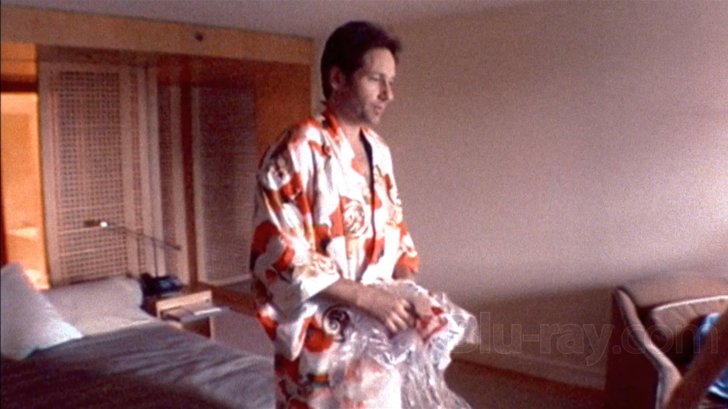
As Soderbergh acknowledges in his commentary, Full Frontal doesn't have a plot in the traditional sense. The script grew out of a series of short, self-contained scenes written by screenwriter Coleman Hough that Soderbergh liked and thought could be woven together. Most of them felt realistic, but one in particular struck Soderbergh as movie-like. Thus was born the conceit of a movie-within-a-movie. Two narrative devices drive Full Frontal. The first is an imaginary film called Rendezvous being produced by Gus Delario (David Duchovny) and starring Francesa Davis as "Catherine" (Julia Roberts) and Calvin Cummings as "Nicholas" (Blair Underwood). A set of fake credits for Rendezvous runs near the beginning of Full Frontal, and we see just enough of it to get a flavor of its mood. The second device is a lavish party being thrown by Gus to which many of the cast and crew of Rendezvous have been invited. Full Frontal drops in and out of the lives of these people, and others connected to them, during the day leading up to the party. The prevailing mood is one of quiet (and sometimes not so quiet) desperation. Every situation is rife with embarrassment and the kind of deadpan humor that is now a staple of prime time TV comedy but, in 2002, was still unfamiliar to an audience that hadn't yet experienced the original British version of The Office. Take, for example, the writers of Rendezvous, Arthur "Arty" Dean (Enrico Colantoni) and Carl Bright (David Hyde Pierce). Arty's true love is the theater, where's he's trying to mount a bizarre play in which he imagines Hitler as an everyday Joe. His star (Nicky Katt) is such an insufferable egomaniac that other actors keep quitting, but Arty plows onward, because the show must go on. Meanwhile, Carl plays house-husband to his wife, Lee Bright (Catherine Keener), who works in human resources at the talent agency principally responsible for Rendezvous. A desperately unhappy woman, she passes her time humiliating job applicants, belittling her husband and having affairs. But she earns good money. Lee's sister, Linda Sharp (Mary McCormack), doesn't make good money. She barely supports herself as a masseuse. On this particular day, one of her bookings happens to be the famous Gus, in whose hotel room Linda experiences an uncomfortable encounter that involves one of the more literal interpretations of the title phrase "full frontal". Francesca and Calvin wander through this landscape, in and out of character as "Catherine" and "Nicholas", and everyone crosses paths with numerous famous individuals, including director David Fincher, Brad Pitt, "Harvey" (Jeff Garlin), who is clearly intended to be Harvey Weinstein (and looks the part), and even Terence Stamp and Nancy Lenehan reprising their roles from Soderbergh's previous film (and minor masterpiece), The Limey. What does it all add up to? That's hard to discuss without giving away the few events that could be said to constitute the film's story. Suffice it to say that, as in sex, lies, and videotape, developments occur that prompt some of the characters to take a long look at themselves and how they're living. In the end, it's up to the audience to judge which characters will and which ones won't take advantage of the opportunity.
Full Frontal Blu-ray Movie, Video Quality 
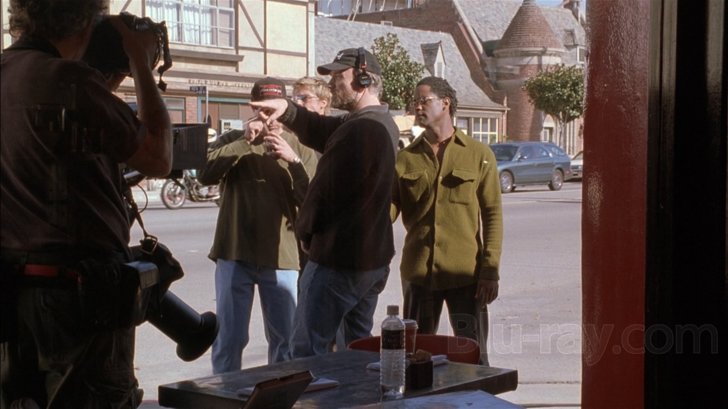
Once again serving as his own cinematographer (under the pseudonym "Peter Andrews"), Soderbergh shot most of Full Frontal with consumer-grade Canon XL-1 cameras. The sole exception is the fictitious film-within-a-film, Rendezvous, which was shot on 35mm. The photographic style makes Full Frontal an odd choice for Blu-ray, because like the similarly filmed 28 Days Later, the image for most of the film is soft, fuzzy and lacking in both detail and definition. Colors have the watery, diluted quality of a blow-up, and the blacks are seldom truly black. Soderbergh was clearly going for a kind of surreptitious, eavesdropping feel to this footage, and he more than achieved it. (I saw Full Frontal theatrically, and I can assure readers that it didn't look any different on the big screen.) The relatively small portion of the film shot in 35mm looks just fine, with good detail, solid blacks and well-delineated (though muted) colors. Soderbergh makes it clear in the extras that he wanted a sharp contrast between the "fake" reality of movies and the everyday reality of the other interactions. Whatever one may think of the result, the director achieved his goal.
Full Frontal Blu-ray Movie, Audio Quality 
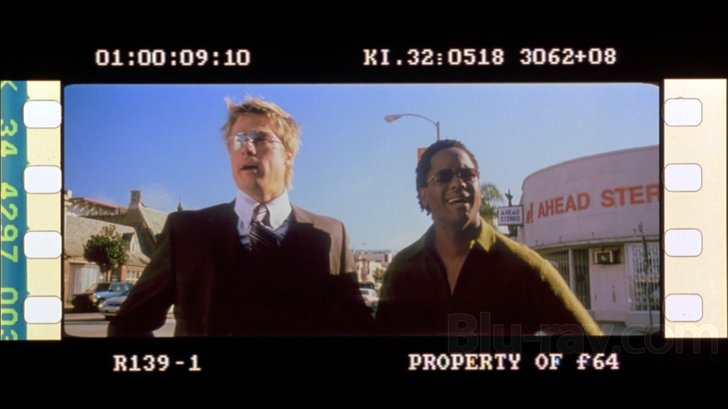
Full Frontal was released to theaters with a 5.1 soundtrack, and Miramax's 2003 DVD had Dolby Digital 5.1 sound. Echo Bridge's Blu-ray offers only 2.0 sound, formatted as lossless DTS-HD MA 2.0. In this instance, however, there may be a rational explanation for the change. Since Echo Bridge has used a cut of the film other than the theatrical release, a 2.0 soundtrack may be all that exists for this extended version. I'm among the first to complain when a Blu-ray delivers less than it should, especially when the package is misleadingly labeled. With Full Frontal, though, the difference between 5.1 and 2.0 is less damaging to the experience than it might be with other films. Soderbergh and his sound mixer, Larry Blake, had already demonstrated in Traffic that their approach to films with a documentary style was to forgo almost all rear channel activity and concentrate the sonic presence in the front. That is effectively how the Blu-ray's 2.0 soundtrack works, even when playing back through an advanced surround decoder. The dialogue is clear, and the minor amounts of underscoring (by Jacques Davidovici) play with acceptable fidelity.
Full Frontal Blu-ray Movie, Special Features and Extras 
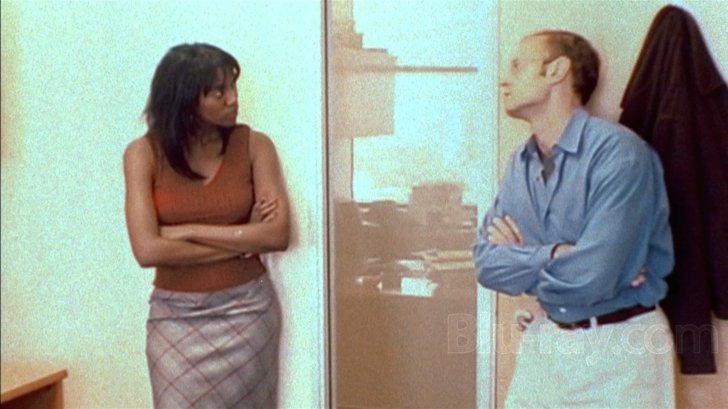
The extras have been ported over from the 2003 Miramax DVD, but the Blu-ray omits the film's trailer, as well as commentary on the deleted scenes. The DVD also had a textual listing of Soderbergh's semi-humorous "rules" for the cast, but these can be found under the film's entry at IMDb. Also, as previously noted, the so-called "Alternate Edit" is, in fact, the film's theatrical version, which is included here in standard definition with the commentary that was included as an option on the DVD as the sole audio track. There is no option to watch the theatrical version without commentary; only the 112-minute extended version included in HD can be watched as a film. (The 101-minute running time listed on the Blu-ray jacket is an error; that is the running time of the theatrical release/"alternate edit" with the commentary.)
- Spy Cam (480i; 1.33:1; 3:08): Excerpts of candid black-and-white footage from the set.
- Deleted Scenes 1 (480i; 1.85:1; 8:21): Some of these are quite funny, probably too funny to fit comfortably into the film.
- Deleted Scenes 2 (480i; 1.85:1; 9:01): Nearly all of these appear in the 112-minute version of Full Frontal presented as the main feature on this Blu-ray.
- Cast Interviews (480i; 1.33:1; 58:48): Soderbergh interviewed the cast in character and used the results for the voiceover narration that punctuates the film. In these excerpts, you can hear the questions off-camera that prompted the improvised answers.
- Alternate Edit with Commentary (480i; 1.66:1, enhanced; 1:40:49): Soderbergh and screenwriter Coleman Hough provide an informative discussion of the film's history, the writing process (including such last minute revisions as making Lee and Linda sisters), Soderbergh's history with various actors, his thoughts on the film's subject matter and the various contributions of the actors to the process. Even if you don't think the film works (and most viewers don't), the commentary is fascinating, because there are few directors with the confidence to speak so openly (and without apparent rancor) about an experiment that they enjoyed undertaking, even though the outcome was poorly received.
- A Conversation with Steven Soderbergh (480i; 1.33:1; 7:08): Soderbergh describes the genesis of Full Frontal, which he felt he had to undertake because Ocean's Eleven was the "least threatening" film he could make, whereas Full Frontal was unknown territory. "If Woody Allen moved west and dropped a lot of acid, he might come up with something like this. But then again, he may not."
Full Frontal Blu-ray Movie, Overall Score and Recommendation 
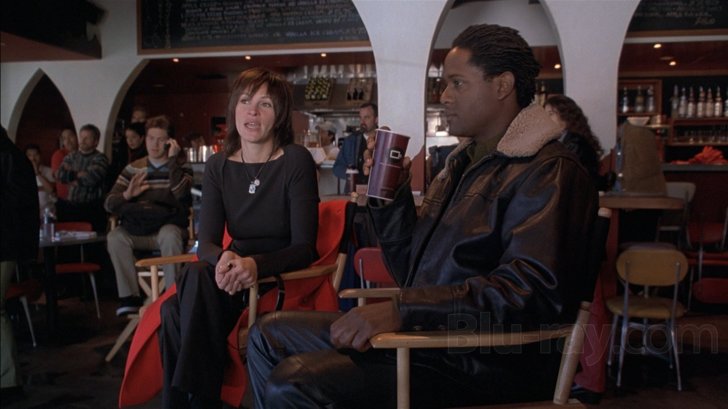
The notion of Full Frontal as somehow a "return" to Soderbergh's roots in sex, lies, and videotape is tantalizing, but ultimately it was probably more of a personal statement than a key to deciphering a film that, even today, feels somehow unfinished. The bracing effect that one still gets from sex, lies results from its being a young person's film; at the conclusion, obstacles have been cleared away and the future looks brighter for both Graham, the future filmmaker, and Ann, the young wife who married badly and now knows what she really wants. Full Frontal is the work of someone much older and more chastened. It's as if Graham had gone on to a successful career and, in the process, rediscovered that everybody lies—most of all to themselves. An interesting film, but it's not for everyone, and this Blu-ray has enough issues that I hesitate to recommend it. Decide for yourself.
Similar titles
Similar titles you might also like
(Still not reliable for this title)

Rich and Strange
East of Shanghai
1931

A Countess from Hong Kong
1967

Submarine
2010

Crossing Delancey 4K
1988

Daughters of the Dust
1991

So This Is Love?
1928

Design for Living
1933

Waves
2019

It Happened One Night
1934

The Farmer's Wife
1928

Platinum Blonde 4K
1931

The Knack... and How to Get It
1965

Modern Romance
1981

The Deep Blue Sea
2011

The Palm Beach Story
1942

Storm in a Teacup
The Vivien Leigh Anniversary Collection
1937

Hollywood Ending
2002

Anna Christie
Warner Archive Collection / Includes German-Language Alternate Version
1930

Rust and Bone
De rouille et d'os
2012

Mr. Jealousy
1997
